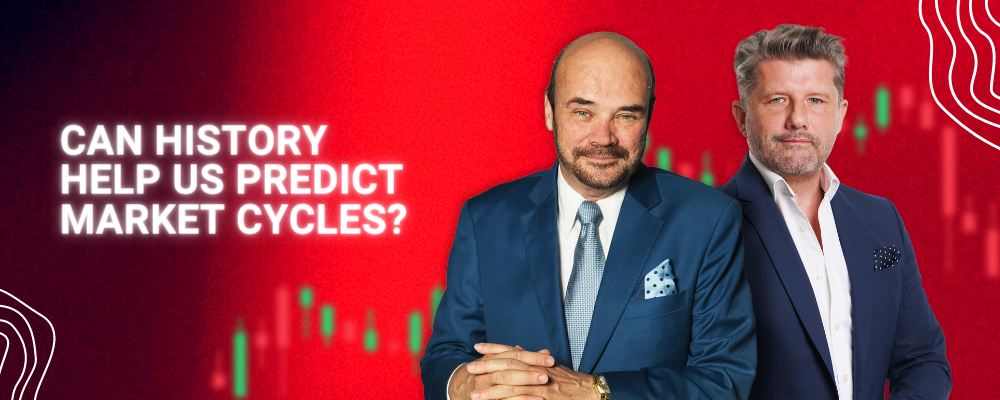Can History Help us Predict Market Cycles?

Bright Minds
Bright Minds is a new podcast hosted by Money Manager and Trading Expert Patrick Munnelly. Through insightful conversations with notable guests, ranging from economic forecasters to psychologists and experienced traders, we seek to answer the most commonly asked questions around trading and investing. Bright Minds is not just another podcast about trading: it goes deep into the psychological aspects of trading, such as tips on how to handle trading losses and on the trading mistakes to avoid. Listen or watch to the full episodes: www.tickmill.com/tools/bright-minds-podcast
Can we predict the future behaviour of the markets?
Arguably, the main objective of traders is to correctly predict future market conditions and act accordingly. Any successful trader will have a system that tells them when to enter the market, whether this is based on past performance or on intuition and gut feeling.
But what if we could discover patterns to predict future market events and market behaviour, by examining historical events and the performance of currencies through hundreds of years?
Martin Armstrong has dedicated his entire professional career doing just that. For nearly 50 years, Martin has been at the forefront of economic forecasting. His Economic Confidence Model has been used to identify cycles within the global economy and to predict major economic events.
A conversation with Martin Armstrong, economic forecaster
Patrick: Martin, could you tell us how you transitioned from trading coins and stamps as a teenager to the world of market and cycle analysis and prediction?
Martin: I started as an early trader in precious metals. When Bretton Woods collapsed in ‘71, there were few people who understood currencies because they had been fixed since 1934. I was brought in to help understand the situation when Franklin National Bank in New York went down due to a 7.5% move in the Italian lira. From there, I became the go-to person for every crisis because I understood currency trading, which was a black hole for many at the time.
Patrick: So, you were able to identify cycles and patterns within currency markets through your approach to historical analysis?
Martin: Yes, I found that all markets trade the same because the common denominator is human nature. We react the same way regardless of whether we're trading wheat, corn, gold, or a currency. What you're really looking at in a chart is how humans are interacting with that instrument.
Patrick: How did you connect the historical analyses of cycles, some of which go back to the Roman period, with modern market theory and analysis?
Martin: Studying ancient economies, like the Roman one, is fascinating. For instance, the debasement of silver coins to virtually nothing but a piece of bronze took only eight years. Financial cycles and panics have always been with us, as evidenced by writings from people like Cicero.
Patrick: You've developed the Socrates platform. Could you tell us a bit more about that and what it offers to users?
Martin: I initially studied law, but my father pushed me into computers. I understood how to build a computer and realized I could write a program to keep track of trading. That's how Socrates started. It expanded as I added more data and realized everything in the world is correlated. Socrates tracks everything globally, forecasting events by watching international capital flows.
Patrick: I remember the first time I was introduced to your work was through your Economic Confidence Model. Could you tell us more about that?
Martin: We took a list of financial panics that expanded 224 years and found a regular pattern and cycle of 8.6 years. This cycle is global and systemic in everything. It incorporates everything from wage and price controls to hyperinflation. The model has taught me a lot and has never been wrong on the long term.
Patrick: Over the years, you've worked incredibly hard to provide insight and tools for traders and investors of all levels. Why has this mission been so important to you, and what drives you to continue to produce high-quality work?
Martin: What I hope to achieve is to protect the future for my own grandkids and others. By educating people, we can affect the future geopolitically and economically. It's beyond trading.
To find out more about Martin Armstrong and his theories, visit Armstrongeconomics.com and Ask-socrates.com.
Disclaimer: The material provided is for information purposes only and should not be considered as investment advice. The views, information, or opinions expressed in the text belong solely to the author, and not to the author’s employer, organization, committee or other group or individual or company.
Past performance is not indicative of future results.
High Risk Warning: CFDs are complex instruments and come with a high risk of losing money rapidly due to leverage. 72% and 73% of retail investor accounts lose money when trading CFDs with Tickmill UK Ltd and Tickmill Europe Ltd respectively. You should consider whether you understand how CFDs work and whether you can afford to take the high risk of losing your money.
Futures and Options: Trading futures and options on margin carries a high degree of risk and may result in losses exceeding your initial investment. These products are not suitable for all investors. Ensure you fully understand the risks and take appropriate care to manage your risk.
